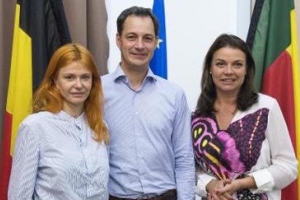Belgium announces decisive push to eliminate sleeping sickness by 2025

Deputy Prime Minister and Minister of Development Cooperation Alexander De Croo announced plans to eliminate sleeping sickness by 2025 today in Geneva, where global health experts are meeting to discuss Neglected Tropical Diseases (NTDs). If sleeping sickness is not addressed, over 50 million people are at risk of contracting the disease.
Minister De Croo announced in Geneva that Belgium will allocate 25,3 million euro (27 million US dollars) over the next nine years to eliminate sleeping sickness. In addition, the Bill & Melinda Gates Foundation has committed to match Belgium’s contribution to the fight against sleeping sickness. At the Second Global Partners’ Meeting on Neglected Tropical Diseases in Geneva, Belgium is also formally joining the international coalition to control, eliminate and eradicate 10 NTDs.
Leading global expertise
Minister De Croo’s announcement comes after Belgium’s decision to invest 11,2 million euros (12 million US dollars) in a five-year programme for innovative sleeping sickness control at the Institute of Tropical Medicine (Belgium), one of the world’s leading institutes for training and research in tropical medicine.
“We are at a turning point. The final elimination of sleeping sickness is achievable. Belgium has a proven track record and brings on board world renowned scientific expertise. With the combined commitment of strong partners across the public and private sectors, I am confident we will succeed. Together, let us kiss sleeping sickness goodnight - once and for all,” said Deputy Prime Minister and Minister for Development Cooperation Alexander De Croo.
Bill Gates, co-chair of the Bill & Melinda Gates Foundation, said: “Belgium’s sustained efforts to eradicate sleeping sickness in the Democratic Republic of Congo represent some of the best progress we have achieved in tackling NTDs. We look forward to continuing our collaboration with Belgium and other partners in our collective fight against these diseases that cause pain and suffering for many of the world’s poorest people.”
Over 50 million people at risk
According to the World Health Organization, up to 20,000 people worldwide may be infected with sleeping sickness. If untreated, sleeping sickness has a mortality rate of nearly 100% and over 50 million people are at risk of contracting the disease. Currently, sleeping sickness is spread over 24 countries. Last year, 13 out of those 24 countries reported new cases, representing close to 3,000 newly infected people. The Democratic Republic of Congo is the most affected country with 85% of the new cases reported there.
Sleeping sickness or Human African Trypanosomiasis (HAT) is caused by a parasite that is transmitted by the tsetse fly. The disease is characterized by fever and increasing weakness in the initial phase. In the second phase, the brain is affected, which leads to changes in sleeping patterns and insomnia followed by irreversible coma hence the name sleeping sickness.
Simpler and safer diagnostics and treatment
Belgium’s expertise in fighting sleeping sickness is widely recognized. Sleeping sickness was almost eliminated when the Congo became independent in the early 1960s. But, after a period of chaos and instability, the disease came back with a vengeance. A second attempt was made during the 1980s with sleeping sickness starting to decline again. But again, a new period of chaos and instability compromised progress.
“For the third time, the elimination of sleeping sickness is within our grasp. But the odds are now in our favour. Innovative research has led to simpler and safer diagnosis, treatment and prevention. Rapid testing kits are replacing earlier complex diagnostics, oral treatment with tablets will substitute toxic injections and infusions, and digital tools and satellite image-based maps for key geographies make it easier to report and track infections and create locally relevant and impactful plans in the field. Further, simple and inexpensive “tiny targets” for vector control are increasingly being used to reduce tsetse fly populations, which dramatically reduces repeated human/fly contact necessary for transmission of the parasite. These innovations catalyse Belgium’s ambition to lead the fight for the elimination of sleeping sickness,” concluded Minister De Croo.
Commitment to the Sustainable Development Goals
Belgium’s plan to eliminate sleeping sickness is part of its commitment to the Sustainable Development Goals. Neglected tropical diseases such as sleeping sickness primarily affect the world’s poorest. Tackling these diseases head on has a direct positive impact on many people’s lives.


